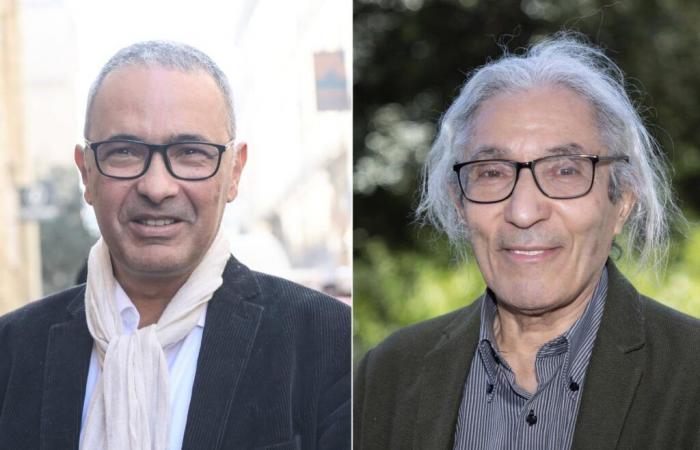Kamel Daoud in Paris on November 4, 2024 and Boualem Sansal on June 1, 2024 in Nice. ONE HARSIN/KICK – SYSPEO/KICK
Facebook Twitter E-mail Copy link
Send
Free access
Goncourt Prize winner Kamel Daoud is the target of two complaints in Algeria while Boualem Sansal was reportedly arrested in Algiers. In the background, diplomatic tensions between Paris and Algiers.
Striking coincidence. Kamel Daoud and Boualem Sansal, both Franco-Algerian writers, find themselves, a few days apart, in the viewfinder of Algiers. The first, recent winner of the Goncourt Prize for his novel “Houris”, is accused of having drawn inspiration without authorization from the life of a survivor of a massacre from the Black Decade. Boualem Sansal, whose relatives have not heard from him for a week, was reportedly arrested on Saturday, November 16, at Algiers airport as he returned from Paris. He has since been in prison.
How can we understand this relentlessness against two authors? Apparently, they are accused of very different things. “Houris”, by Kamel Daoud, was banned in Algeria upon its release, under article 46 of the Charter for Peace and National Reconciliation (highlighting the novel), which punishes anyone with imprisonment. “uses or exploits the wounds of the national tragedy to undermine the institutions of the Algerian People's Republic and weaken the State […] or tarnish the image of Algeria internationally”. But the attacks against him now go further.
Also read
Billet Kamel Daoud, a very political Goncourt
Free access
Read later
Friday, November 15, a survivor of a massacre in the 1990s, Saâda Arbane, declared on Algerian TV that Kamel Daoud had appropriated his own story for his novel. Like Saâda Arbane, Aube, the main character of “Houris”, survived a failed throat slitting, wears a cannula, maintains a difficult relationship with her mother, manages a hair salon… According to her testimony, Saâda Arbane confided her memories and her traumas to a psychiatrist, who has since become the wife of Kamel Daoud. She denounces a violation of medical confidentiality. She even filed a complaint as soon as the book was published in early August. According to his lawyer, Me Fatima Benbraham, another complaint was filed against Kamel Daoud, at the same time, “on behalf of the National Organization of Victims of Terrorism”.
Uncertainty for Boualem Sansal
In the case of Boualem Sansal, 74 years old, the greatest uncertainty remains regarding his situation. According to an article in “Figaro” published this Friday, November 22, the writer and the journalist who accompanied him “are said to be in the hands of the Algerian secret services and held incommunicado for six days. They would be accused of “intelligence with the enemy””. What enemy are we talking about? Possibly from France. This Friday evening, its publisher Gallimard expressed its “deep concern” and called to his “immediate release”.
Also read
Testimony My Algeria, by Boualem Sansal, in 2021: “It is not up to politicians to dictate history, but to hear it”
Subscriber
Read later
A writer very critical of the Algerian regime, the author of “Oath of the Barbarians”, round glasses and whitened ponytail, could have paid for his recent statements to “Frontières”, a renowned far-right media outlet: “When France colonized Algeria, the entire western part of Algeria was part of Morocco: Tlemcen, Oran and even as far as Mascara […]. When France colonized Algeria, it established itself as a protectorate in Morocco and decided, arbitrarily, to attach all of eastern Morocco to Algeria, by drawing a border. »
Western Sahara is today catalyzing the strong tensions between France and Algeria. During his trip to Morocco at the end of October, French President Emmanuel Macron indeed recognized “Moroccan sovereignty over Western Sahara”thus further burying Franco-Algerian diplomatic relations already at a standstill. Since then, the Algerian government has undoubtedly hardened its positions towards France. A policy for which Kamel Daoud and Boualem Sansal seem to pay the price in a spectacular and dramatic way, in the case of Sansal.
In a text published on the “Point” website, this Friday, November 22, Kamel Daoud reacts to the fate of Boualem Sansal, whom he calls “my brother”. He writes: “I thought I had paid the highest price for my last novel. No. Even more expensive books exist: Sansal demonstrated this. A country that treats its writers badly is a country that is missing its future, because it is missing the dream opportunity. […] My brother Sansal is behind bars, like the whole of Algeria. »






